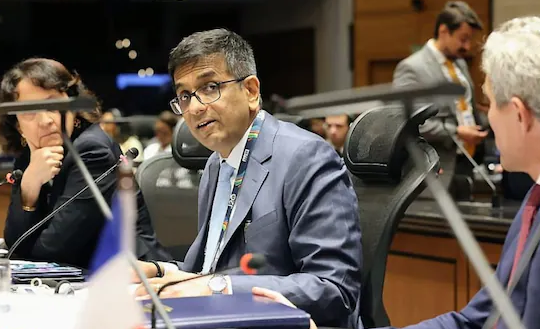Recently, CJI Chandrachud stated that “Institutional trust in courts and their credibility is the very basis of a thriving constitutional order”.
CJI Chandrachud was speaking at the Bhutan Distinguished Speakers’ Forum, a part of the Jigme Singye Wangchuck Lecture Series, on the subject of ‘Judicial Legitimacy through accessibility, transparency and technology: the Indian experience’.
Dealing with the issue of public trust, the CJI said that courts do not directly hold resources as trustees of people. But as public functionaries, the courts are vested with the responsibility to give effect to equity, and judicial bodies are not directly in charge of the manner in which resources are distributed.
CJI added “However, it does fall upon us to adjudicate the fairness of that distribution, should it be questioned. Yet the courts of the country do require public trust and legitimacy. Institutional trust in the constitutional and other courts of the country is the very basis of a thriving constitutional order.
“Public trust is central to the credibility of the judicial branch which is otherwise insulated from public opinion in its operations — as it must be. The Indian Supreme Court prides itself in being the people’s court,” the CJI said, adding that the judiciary on several occasions questioned the distributional fairness of state largesse such as contracts and natural resources by other wings of the government.
CJI Chandrachud said judges are supposed to act unencumbered by popular morality when deciding constitutional or legal questions.
“Even at the level of trial courts, judges are supposed to apply the letter and the spirit of the law with clinical detachment from the popularity of their decisions. Thus, neither the appointment nor the continuity of judges is determined by popular mandate enjoyed by their decisions, in that sense. In fact, populist decision-making sits rather uncomfortably with judicial independence,” Chandrachud said.
He also referred to the concept of the Public Interest Litigation (PIL) jurisdiction in India and said it became a unique part of the nation’s constitutional order, which was co-opted by several other jurisdictions.
The CJI said India has been using technology to counter barriers to accessibility to the courts.
CJI Chandrachud said “Our e-courts project began in 2007 as a countrywide initiative to improve judicial efficiency and justice delivery. We now have the facility of filing cases at the click of a button through our e-filing platform. We have been witnessing a marked decline in physical filings,” he said.
The CJI also referred to hybrid hearings in courts and said they were introduced in order to tackle COVID-19-induced nationwide lockdowns and now, are a feature of Indian courts.
“Virtual Courts and video-conferencing have helped us overcome the massive geographical limitation faced by our litigants from smaller pockets of the country. Also, persons with physical impairments, pregnant women, and persons in their advanced years can now access the courtroom virtually,” he said.
CJI Chandrachud concluded by stating that technology is not a one-stop panacea for all social inequalities but the country must not shy away from tech-enabled measures that further judicial accountability.


